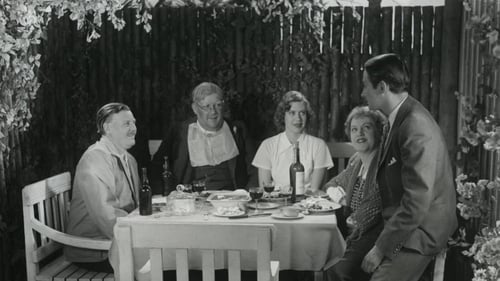
Familien Olsen is a 1940 Danish family film directed by Lau Lauritzen, Jr. and Alice O'Fredericks.

Teaterdirektør

A bully browbeats his wife and children until he meets his match in the woman who raised him.

On New Year's Eve, the convicted murderer, Strong Henry, escapes from prison and collects his son from the orphanage. When he breaks into a local manor to get some milk for his child, he is surprised by a young woman, Eva. Out of pity, she decides to help the stranger, but unfortunately some of the manor's other occupants wake up and call the police. Fourteen years later, Henry is released from prison. Convinced that Eva betrayed him, he sets out to take revenge and find his son.

The opium smoker Hugo is the youngest son of Baron von Kaufmann, who also is a victim of the drug habit. Hugo is insanely jealous of his older brother Ernest. When Ernst's engagement with beautiful Henny is announced at a costume ball Hugo he gets furious. Observed by his valet he is calmed down. Hugo's valet see's his opportunity to strengthen his position.
The film was banned in Denmark. Instead it opened in Finland.

Edmond, ung løjtnant
The two young officers Edmond and Clayton both fall in love with Rose – the daughter of the Minister of War. When Rose falls victim to a serious accident, Clayton risks his life to save her whereas Edmond cowardly shrinks from helping. As Rose and Clayton become a couple, Edmond's jealousy gets the better of him. (stumfilm.dk)

Writer
A young woman, Nina, works as a singer at a Copenhagen variety theatre, but when her contract expires she suddenly finds herself with no income to support her and her old mother. Upon seeing a newspaper advertisement looking for singers for a theatre in St. Petersburg, Nina jumps at the chance – and a few weeks later she is on her way. However, the advertisement is a hoax, and she actually ends up in a notorious brothel. She fears that all hope is out, but at the same time her sailor boyfriend has just landed in St. Petersburg and is leaving no stone unturned to find his beloved.


Valdemar Kemp, helten fra 64
Everything is peace and quiet at the family Kemp's house in Sønderborg, but danger is lurking outside their doors. The war has just begun, and the young Valdemar Kemp goes away to fight for his mother country. The Danish soldiers put up a brave fight on the battlefield, but the German army is to strong. One after the other, Valdemar's friends are slaughtered, and his hopes of reuniting with his girlfriend and family slowly fade. (stumfilm.dk)

This film was plagiarized - almost scene by scene - by Nordisk Film Kompagni who released their version only a few months later (2. August, 1910) with the exact same title!.

Danerkongen
FRAGMENT | In the cellars of Kronborg, a fully armed Holger the Dane sits quietly sleeping when he is suddenly called into action. Princess Gloriant has fallen into the clutches of the heathen giant Burmand, so Holger must act swiftly. Fortunately, he arrives in time to prevent the abductor from harming his intended victim. Only a fragment of the film has been preserved. In its entirety, it told the tales related in the two legends about ‘Holger Danske and Didrik the Strong’ and ‘Holger Danske and Burmand’. (stumfilm.dk)

This movie created the basis for a major film production in Århus in years 1909-1913. In those years were in Aarhus produced half a hundred films, respectively, by A / S Fotorama and A / S Danish Film Factory. This clip is an excerpt from the film - The little horn blowing - which premiered in 1909. It was the longest film produced in Denmark with her 20 min. The film played out during the three-year war 1848-1850 and the manuscript was written on HP Holst's poem - The little horn blowing. This sold 150,000 tickets nationwide.

Ambrosius Stub is elated when he gets the position as a writer, working for the Baron. This means a steady income and new experiences, as well as various new acquaintances. Among the latter lurks a dangerous infatuation that has fatal consequences for Ambrosius. The film is an adaptation of Chr. K. F. Molbech’s 1877 play of the same name. (stumfilm.dk)








